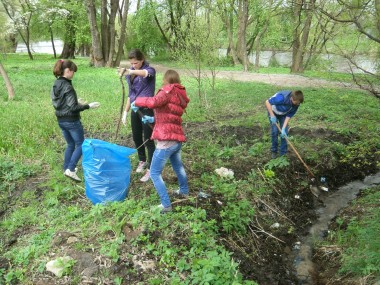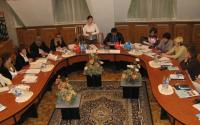Yaremche (Ivano-Frankivsk Region) 28-29 May: About 40 local councillors from AR Crimea and other regions of Ukraine and leading experts in the area of decentralization and local self-governance have gathered to share innovate practices of local governance and their application experience in Ukraine at a workshop organized by the UNDP-led Municipal Governance and Sustainable Development Programme with support of Canadian International Development Agency. The participants improved their capacities in social mobilisation, strategic, operational and financial planning and innovative practives in local self-governance across Ukraine.
Experts say decentralization is an integral part of market reforms leading to sustainable economic, ecologic and social development. Real decentralization improves quality of public services delivered to citizens and considerably raises the living standards within municipalities. In addition, redistribution of powers improves local decision-making process and setting policy priorities, lowers the cost of services according to the actual tastes of local population.
Decentralization reform is on public agenda in Ukraine and always generates a lively debate. Since 2004 UNDP has been working through one of its projects - Municipal Governance and Sustainable Development Programme -to build the capacities of central and local governments to decentralize fiscal and administrative authority by applying social mobilization tool and community-based approach.
UNDP/MGSDP conducted a survey among representatives of 22 partner municipalities at the end of 2008 with the majority of respondents expressing a demand for obtaining information about decentralization and its practical components. MGSDP organized a number of workshops and trainings to provide best examples of decentralized democratic governance to decision-makers at the local level in Ukraine.
The workshop entitled "Decentralization and Effective Local Self-Governance" offered the participants best practices of operational, financial and strategic planning, energy-saving initiatives in the context of sustainable urban development. They looked at topics as certification of municipal services according to international standard ISO-9001:2000, and community participation in local development, in particular, in housing and municipal economy, etc. In addition, the participants learned the inticacies of introducing the European Strategy for Innovation and Good Governance at Local Level, - a guidance paper worked out by the Ministry of Regional Development and Construction of Ukraine.
Ihor Koliushko, Head of the Centre for Policy and Legal Reforms, presented decentralization as a complex multi-faceted concept. He said that municipalities had opportunities to improve their organisation and operations irrespective of whether the central government had a political will for a full-fledged decentralisation and administrative reform. In order to improve administrative service delivery, he recommended applying Draft Administrative Procedural Code and improved governance system ISO 9000.
"The success of decentralization reform on large part depends on the readiness of local authorities to work in new conditions. Therefore, it is highly important to organise similar trainings and educate local civil servants on the reform principles and the new working opportunities the reform may bring with", he said.
Volodymyr Brygilevych, Head of Lviv-based Centre for Research of Local Self-Government, presented international experience of citizens' participation in operation and maintenance of housing stock and briefed about German/Polish model of reform which could be applicable in Ukraine.
This model envisages that the owners of the property organize themselves in condominiums, management and service-providing companies. He proposed additional measures that could be taken to promote the reforming of housing stock maintenance in Ukraine.
First, the local authorities should encourage establishing condominiums. "Our experience shows that co-financing of repair and reconstruction with participation of the city council and local community is very effective for encouraging establishing the condos", he added.
Second component of the reform is developing the market of quality services and market of professional managers.
UNDP/MGSDP successfully supported its partner municipalities in the introduction of improved governance system in line with the international standards.
In 2008, Voznesensk introduced quality management system ISO 9001:2000 and now the number of municipalities intending to apply for support and consultancy to improve the quality of work is rising.
Valeriy Guliy, Associate consultant of Lutsk-based Centre for Support of Development, said: "Over 20 municipalities across Ukraine have introduced municipal governance quality management system in line with the international standards. A necessary condition for introduction of the system is stable willingness of local authorities to improve their own operations and achieve international quality in their management".
Nadiya Bondarchuk, Deputy Director of Department of Regional Policy at the Ministry of Regional Development and Construction of Ukraine, presented useful information on the principles of distribution of subvention (transfer) from state budget to local budgets for social and economic development. The subvention is distributed among municipalities with a purpose to implement sustainable social and economic development projects. She called on the leaders of municipalities to apply for this subvention (transfer).
"During the first quarter of 2009, 82 objects were built with total cost of UAH 54 mn owing to the subvention (transfer). The Ministry of Regional Development and Construction is interested in supporting active communities and it is necessary to distribute information among smaller municipalities and train them to submit the projects of their territorial communities", she said.
In her words, in 2008, UAH 1,18 bn was disbursed on social and economic development of the regions which were used on 1,116 objects. In addition, UAH 163 mn from subvention funds went to 160 small cities.
"In 2009, UAH 721 mn is assigned from stabilization fund for implementing investment projects for social and economic development. The Ministry of Regional Development and Construction is interested in the projects submitted by smaller municipalities, which in theur turn have to set priorities for financing and be accountable for results to the state and territorial communities", she said.
UNDP/MGSDP was initiated in 2004 for promoting democratic governance aimed at improving the livelihoods of people in urban areas across Ukraine under the framework of public-private partnership. The Programme cooperates with local communities of citizens, academia, small businesses and civil society organizations in 26 municipalities across Ukraine and other partners in private and public sectors. Together they apply various sustainable development mechanisms. Since 2004 till 2009, UNDP/MGSDP supported 172 local community projects with a total cost of UAH 20.2 mn. For more information on the Project's activities, please visit: http://msdp.undp.org.ua
For more information, please, contact Galyna Gulenko, Monitoring and Communications Officer of UNDP/MGSDP, at 





 +3 ... or via e-mail: galyna.gulenko AT undp.org.ua.
+3 ... or via e-mail: galyna.gulenko AT undp.org.ua.


















